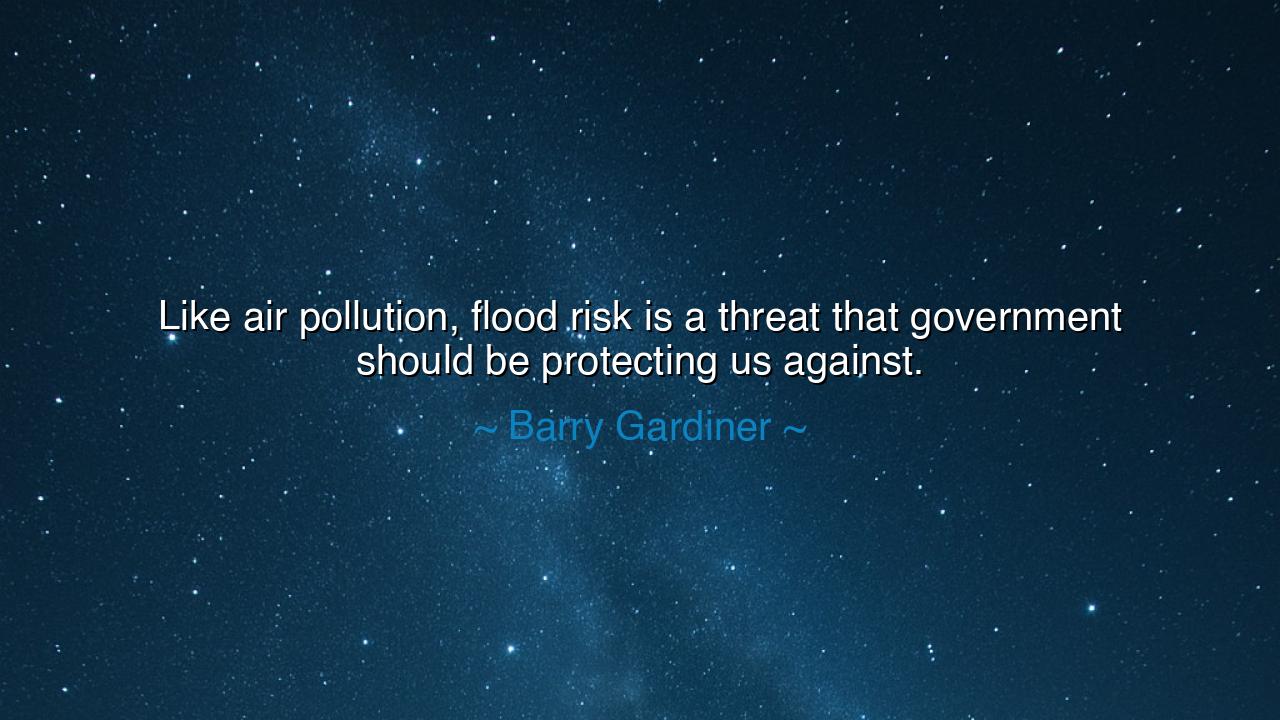
Like air pollution, flood risk is a threat that government should
Like air pollution, flood risk is a threat that government should be protecting us against.






"Like air pollution, flood risk is a threat that government should be protecting us against." – Barry Gardiner
In this clear and solemn declaration, Barry Gardiner, a British politician known for his advocacy on environmental and climate issues, speaks as a guardian of both nature and humanity. His words carry not only political insight but a deep moral weight. When he says, “Like air pollution, flood risk is a threat that government should be protecting us against,” he reminds us that the duty of governance is not merely to administer laws or collect taxes—it is to shield the people from invisible dangers that creep silently into their lives. Air pollution chokes unseen, and floods strike without warning. Both are forces that can devastate homes, ruin livelihoods, and claim lives. Gardiner’s wisdom lies in recognizing that these are not acts of fate alone—they are warnings written by human negligence upon the face of the Earth.
The origin of this quote emerges from Gardiner’s long career championing environmental stewardship in the United Kingdom. As Minister for the Environment under Prime Minister Tony Blair, he saw firsthand how climate change was transforming what once seemed rare natural disasters into constant national threats. Air pollution, born of human progress, poisons the breath of cities. Floods, once seasonal and predictable, now surge through streets and farmland with growing fury as climate patterns shift. His comparison between pollution and floods is deliberate: both represent the unseen cost of inaction, the price paid when governments turn away from their sacred duty to protect the vulnerable.
Gardiner’s words, though rooted in modern policy, echo the eternal wisdom of the ancients: that rulers are stewards of the land and guardians of their people. In the age of kings, the failure to defend against drought or plague was not a mere misfortune—it was a moral failing. So too today, when governments neglect the environment, they betray not only their citizens but the covenant between humankind and nature. For the earth is not an adversary to be subdued; it is a partner whose balance sustains us. Air and water are the twin breaths of life—when they turn against us, civilization itself trembles.
Consider the story of the 2015 Chennai floods in India, when torrential rains overwhelmed the city and left thousands homeless. The disaster was not only natural—it was the fruit of years of unplanned development, clogged waterways, and weak environmental policies. Similarly, in London, the Great Smog of 1952 killed thousands, not because nature had grown cruel, but because man had poisoned his own air with coal smoke and indifference. In both tragedies, the lesson was the same: when government fails to foresee and prevent, its citizens pay the price with their breath, their homes, and their lives. Gardiner’s quote captures this painful truth: the neglect of environmental threats is the most subtle form of betrayal.
The meaning of his message extends far beyond rivers and skies—it speaks to the nature of duty itself. Government, at its purest, is not a structure of power, but a shield against chaos. The people entrust their leaders not only to legislate, but to foresee and defend. Air pollution and floods are metaphors for every danger that grows in silence—corruption, inequality, moral decay. Each begins small and unseen, spreading slowly until the damage is done. True leadership requires vigilance, humility, and courage—the willingness to act before the storm breaks, to serve the future rather than the moment.
Yet Gardiner’s words also hold a note of hope. If man’s neglect can cause such harm, then man’s care can bring restoration. When nations invest in clean air, in flood barriers, in forests and wetlands, they do more than protect property—they honor the sacred balance of life. The Netherlands, for instance, turned centuries of flooding into an art of survival through engineering and respect for water. By embracing nature instead of defying it, they built resilience from vulnerability. Such examples prove that protection is not the work of fear, but of foresight—a harmony between human ingenuity and the wisdom of the earth.
The lesson of Gardiner’s quote is clear and eternal: protection is the first duty of power. To govern well is to look beyond the present, to guard both the physical and moral air that people breathe. Each citizen, too, must share this burden—not waiting for governments alone, but living as caretakers of their shared world. Plant trees, conserve water, speak truth to negligence, and remember that the safety of the many begins with the vigilance of the few.
For in the end, Gardiner’s words are not only a warning—they are a covenant. When air grows foul and waters rise, it is not nature’s wrath that destroys us, but our own indifference. Let every leader, every citizen, remember this truth: a government that protects its people from the storms of nature honors the harmony of creation itself—and a people who protect their world become the stewards of their own destiny.






AAdministratorAdministrator
Welcome, honored guests. Please leave a comment, we will respond soon